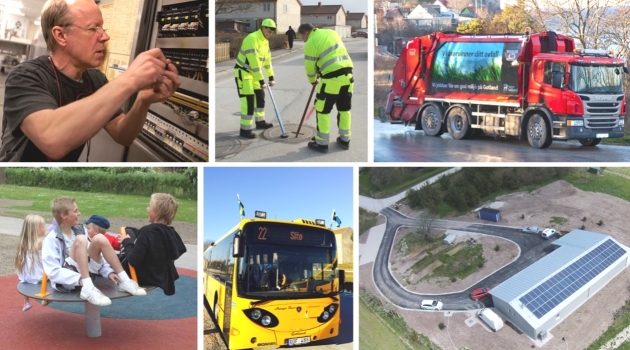Sustainability management by means of a new budget model
A completely new sustainability budget will help steer Region Gotland towards sustainable development. The budget was developed by researchers at Uppsala University, Åbo Akademi University and Stockholm University in collaboration with the Department of Technical Services at Region Gotland.
In Region Gotland’s 2040 development strategy, sustainable development is a central concept and focus area. The Region has great responsibility to pursue sustainable development issues in Gotland society. However, well-developed operational management with clear guidance about what is to be done is required in order to achieve success. At present, there is often a lack of concrete management tools for sustainable development in both the public and the private sector.
“More research and knowledge about sustainability management are needed. This is necessary in order to be able to move from words to action and know what needs to be done to steer towards sustainability goals,” says Mathias Cöster, Associate Professor and Senior Lecturer in Industrial Engineering and Management at Uppsala University.
Pilot project at the Department of Technical Services
Photo: Maria Bergenheim
The Department of Technical Services at Region Gotland has about 600 employees. The Department is responsible for services in a variety of areas such as property management, streets, parks, public transport, water and sewage, refuse collection and harbours. In other words, there are many potential areas where different types of change can contribute to sustainable development in the region.
With this in mind, a collaborative project was started between the Department of Technical Services and researchers Mathias Cöster of Uppsala University and Matti Skoog of Åbo Akademi University and Stockholm University. The Department’s initial aim was to create a carbon budget, but the researchers wanted to broaden the concept.
“Reducing carbon emissions is one type of key indicator, but there are many more when it comes to operational management towards a sustainable future. We have therefore broadened the scope to instead develop a sustainability budget,” says Mathias Cöster.
Budget as a management process
The project began by bringing together the managers of the various departments within the Department of Technical Services for an initial workshop.
“The first thing we did was to discuss the concept of budget itself. It is important to understand that a budget is a type of management tool and also a management process. It basically revolves around three things: planning, measurement and follow-up,” explains Mathias Cöster.
One thing that distinguishes a sustainability budget from a normal budget is the handling of non-financial indicators, meaning key indicators that are not primarily measured in money, such as reduced carbon emissions or reduced water consumption. This also became the task on the agenda at the next workshop – to identify which non-financial indicators are important to monitor.
Budget matrix with non-financial indicators
The work resulted in a budget matrix with concrete key indicators for each department. The matrix also defines what is to be measured, what activities are to be undertaken and what outcomes are expected. A total of four workshops and in-depth interviews were conducted with Patric Ramberg, Chief Administrative Officer of the Department of Technical Services, and Ulrika Jansson, Director of Finance at Region Gotland.
An advantage of this collaborative research method is that insights and lessons learned are created together and provide value for both the organisation and the research in general.
“As a researcher, it is both fun and satisfying to work closely with an organisation and to see how its employees approach these issues. We got concrete output from this pilot study, a budget matrix and a framework that will hopefully create societal benefits in the end,” says Mathias Cöster.
In 2023, Region Gotland will continue to work with implementation of the new sustainability budget. Research colleagues Mathias Cöster and Matti Skoog will follow the continued work and also hope to be granted new funding for further research on the subject.
Maria Bergenheim
Verification for Collaboration (VFS)
VFS is a programme funded by Uppsala University to promote collaboration with the wider community and enable research to be put to good use. VFS offers an opportunity for the University’s researchers and external organisations to develop collaboration on an issue of common interest. The funding is intended to test – verify – whether the collaborating partners have enough in common to build on, e.g. seek further funding.
The project “Verksamhetsstyrning för hållbar utveckling vid Region Gotland” [Operational management for sustainable development at Region Gotland], described in this article, has received funding through Uppsala University’s Verification for Collaboration (VFS).
Project manager: Mathias Cöster, Associate Professor and Senior Lecturer in Industrial Engineering and Management at Uppsala University, and Matti Skoog, Professor of Accounting at Åbo Akademi University and Associate Professor in Business Administration at Stockholm University.

